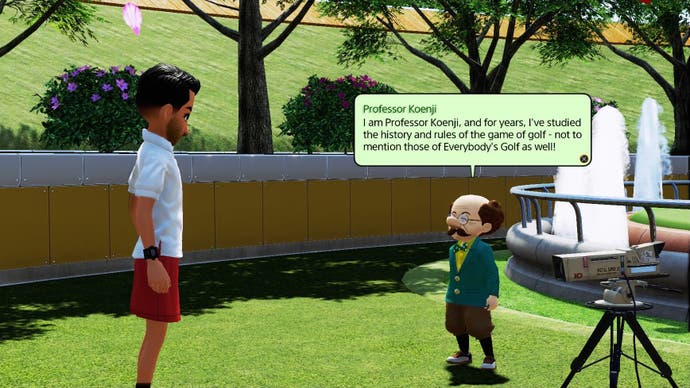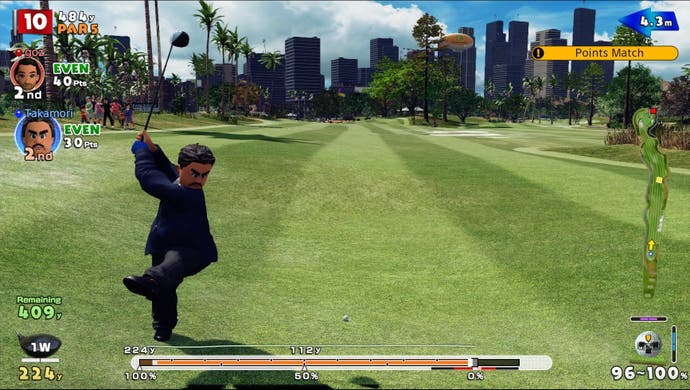Everybody's Golf review
Clap Hanz say yeah.
Few sports labour under as much socio-political baggage as golf. It is a game popularised by royalty, spread by Empire, and moderated by prejudice (exhibit 1/59,674: Lord Moncrieff who, in 1902 decreed that women should only be allowed to play providing they not hit the ball further than 70 yards in order to remain graceful to onlookers).
Everybody's Golf, a series that, at 20, is almost as old as the PlayStation on which it debuted, has always offered a sharp antidote to all the stuffy clubhouse elitism. The series remains not only one of the most poised and rewarding of video game golfing interpretations, but also one of the most accessible and openhearted. That democratising vision is even proudly baked into its title.
Two decades on and, with this, the most lavish and fleshed version of the game yet, developer Clap Hanz's egalitarian remodelling of golf is complete. The game opens with a supremely flexible character creator that allows you to role-play as everything from a podgy businesswoman to a foppish toddler to a cross-dressing dwarf. Clothes, haircuts, accessories, facial hair and even animations are hurled at you as prizes for each successful tournament, and can be arranged in endless humorous configurations, with no restrictions according to age, size or gender. Clubhouse dress codes are obliterated. Everybody's welcome.

Then, when you reach the course, Everybody's Golf cast of misfit players doesn't politely queue for their turn at the tee. Instead there is a thwacking, sprinting, whooping mob of characters, each playing their stroke before toddling off to the next hole. At first it's all a little off-putting (although there is no physical impediment: your ball passes through their ghostly mass). But in time you adapt to, then celebrate this carnival of excitement and activity. Your competitors are no longer faceless names on a shuffling leaderboard, but characters whom you meet at the fairway, cheer on in the bunker, and curse at on the green.
In the long and winding road that is the singleplayer career mode, the busyness that's now found on courses provides an antidote to the gathering sense of solitude that often creeps into video game golf games. Here, by contrast, you feel a sense of being part of a fidgety, carefree cadre of golf-lovers. Online, it is yet more effective. A daily challenge invites every player in the world to compete asynchronously at the same nine holes. As you toddle around the course (it's an open world-style affair; you're responsible for transporting yourself to the tee for each new hole, perhaps snuffling out a few coins, discarded items of clothing or power-up items en route) recordings of other real world players, complete with their resplendent costumes, race around you, increasing the intimacy of the competition.

Then, in Turf War, the second online play mode currently available (a third, international online tournament, is currently 'under construction') the fairway scrum is further encouraged as part of the game's rules. Here two teams are spilled onto a course and each player runs around playing holes in the order of their choosing. Points earned on each hole are added to team's score and the team with the most points 'takes' the hole. It's an ingenious twist that injects the game with an unprecedented sense of mayhem and urgency.
The molten core of the Everybody's Golf experience is, however, pleasingly familiar. The game uses the three-tap control scheme, whereby you set the power of a drive or a putt on a sliding gauge then attempt to strike the ball true by stopping the whisking slider at the right point. A little to the left or right of your target and the ball will pull off course accordingly. Miss by a greater distance and it could end up anywhere. Everybody's Golf allows you to correct mistakes allowing you to boost or reduce the power of a shot by pressing different buttons to stop the gauge - a clever addition, but otherwise the game's feel remains consistent with it vintage predecessors. Everything is delivered with Clap Hanz's typical exuberant overstatement: the pick n' mix colour scheme, the zinging particle effects, the confetti showers when you sink a ball, the comic book onomatopoeic exclamations of 'ting' and 'whizz'. Biplanes streak overhead, their shadows wiping the fairway. Trees rustle. Lakes shimmer, treacherously.
The most major change a fashionable one. Individual clubs can now be levelled up. Every time you hit a long drive, add top- or backspin, or successfully curve the ball around a hazard, you earn a dollop of experience points unique to that club. As clubs level up they become more powerful, reliable or, in the case of your putter, reduce the risk that the ball will bounce off the cup, instead swirling around the rim, as if flirting with a whirlpool, before finally sinking. As clubs level up individually, there's a chance that, for example, your five-iron will become your best club depending on where you hit your most useful strikes. In the online sphere, however, the design has the inevitable effect of making those players who have invested the most time in the game the most likely to triumph.

You earn experience points for each tournament in which you partake. Fill the experience point gauge and, not only do you rise a rank (complete with a 'Look mum!' certificate), but you also draw out a VS competitor, who challenges you to a one-on-one battle. Beat three VS characters and you progress through the beginner to intermediate to expert classes, with tougher opponents and larger prize pots. The hub world, a glittering beach island that, for the game's first few hours, remains weirdly empty, begins to fill as you progress, with new features such as golf quizzes and a intricate fishing mini-game being added to the list of local attractions. Even with expansion, however, the village never quite feels integral to the game's design in the way that the hub did in, say, Everybody's Tennis, where it was filled with side quests and storylines. The career mode's structure soon settles into dry routine.
On the course, however, any sense of creeping monotony dissipates. This is video game golf at its most exuberant, joyous, fast-paced and welcoming. No wonder the series has endured on PlayStation for longer than any other than Gran Turismo. But while Polyphony Digital's take on motorsport is that of the clinician-pornographer, wanting to represent the real sport in exquisite, unadorned detail, Clap Hanz's take on golf is that of the chortling-impressionist, a wild exaggeration of the sport. This is golf, but through a glass brightly. Yet through embellishment, the developer touches something of golf's true, universal appeal in a way that none of its austere, reverent competitors has managed.


